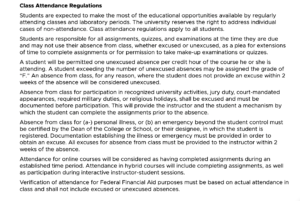
We’re adults now. Why can’t we make our own decisions?
The great debate about if missing a class a certain amount of times should cause students to fail a class, even if they’re passing, seems to keep coming up. Currently, many professors’ syllabi state that more than 3 or 4 unexcused absences will equal a failing grade. So what are the pros and cons?
Pros: Students can work more hours at their jobs, helping them pay for school, housing, or other costs. This would allow them even to work a full-time job that could assist in their desired career path. While most things can get you approved for an excused absence, work is the one thing that is not eligible. On the contrary, this would also allow students to take mental health days when needed to pace themselves throughout the semester. At the end of the day, we pay for classes. Why is there such strict regulation on how often we attend?
Cons: Not counting unexcused absences, will more than likely be abused by students. This could easily turn a 50-student class into a regular five who come after the first two weeks. The good thing is this will only work if the professor posts all assignments on Canvas. Also, while there is hope that this will be used in serious instances only, it probably will not be, as students will use it whenever they don’t feel like attending class. 8 am classes and night classes will be empty. As a student myself, I have to admit that the cons do outweigh the pros. There’s no way to regulate this, and it will turn into many classrooms being empty. Instead, students should take online courses if they need to.
When speaking to students at FAMU, there were many similar perspectives that contributed to this discussion about attendance.
Chris Joseph, an engineering major, feels that the requirement should be removed for many different reasons.
“If a student is able to pass their exams and complete the assigned homework, I don’t see why attendance would be the ultimate factor on why a student would pass or fail a class. The 3 unexcused absence rule may not take into account the additional responsibilities that these students have outside of school. Students with family responsibilities, such as caring for younger siblings or elderly relatives, may find it challenging to attend school regularly,” Joseph said.
Larry Lafrance, a second-year business major also feels that there should be grace extended to students for unexpected circumstances.
“Many times life throws curveballs at us and different people respond in different ways. This past semester I’ve personally had a lot of curveballs that have been thrown at me, alongside bad mental health days. 3 excuses weren’t enough for me this year. I don’t think students should be penalized for 3 unexcused absences,” Lafrance said.
Delia Washington, an MBA Candidate also feels similarly about the issue stating “I feel the requirement should be up for evaluation. I don’t think it’s accommodating to students involved in extracurricular activities.”
Although many students’ perspectives align with getting rid of our current attendance policy, maybe a compromise would be in students’ best interest, expanding the allowed unexcused absences.